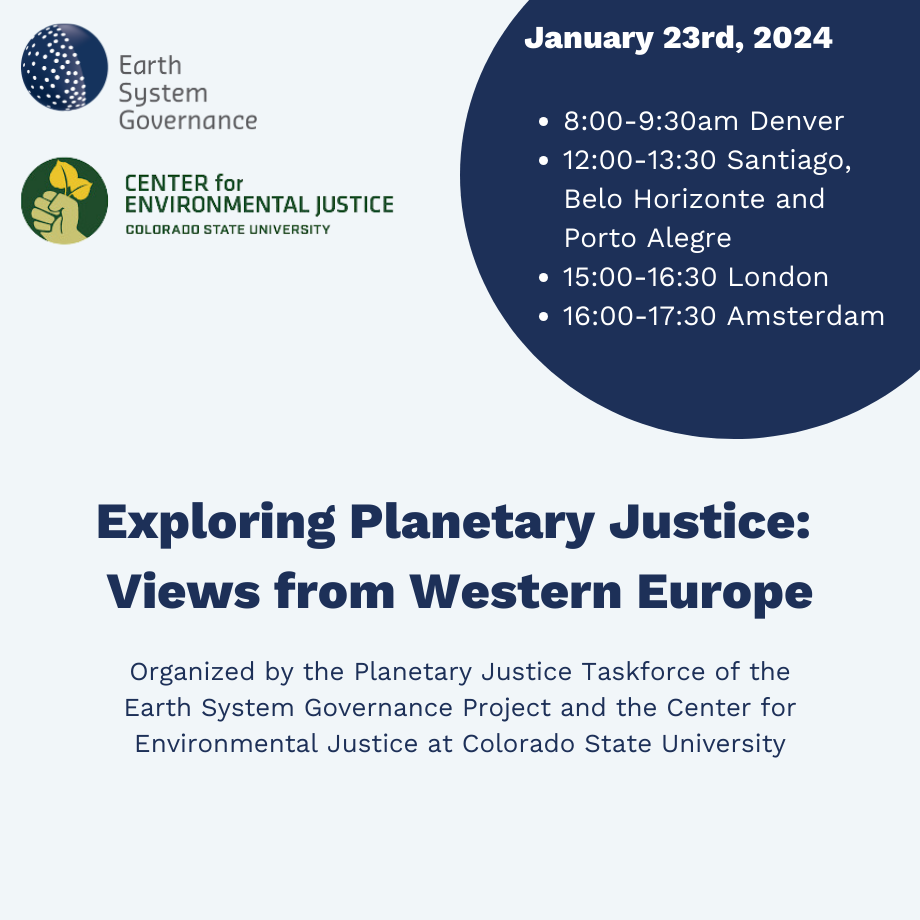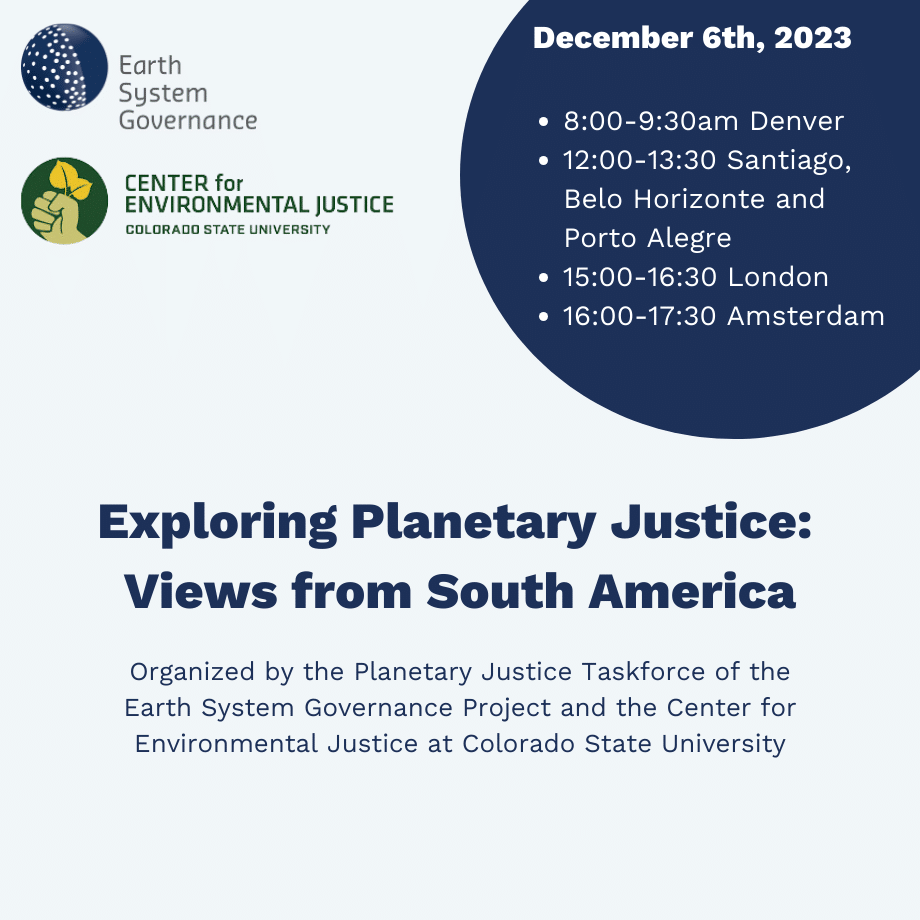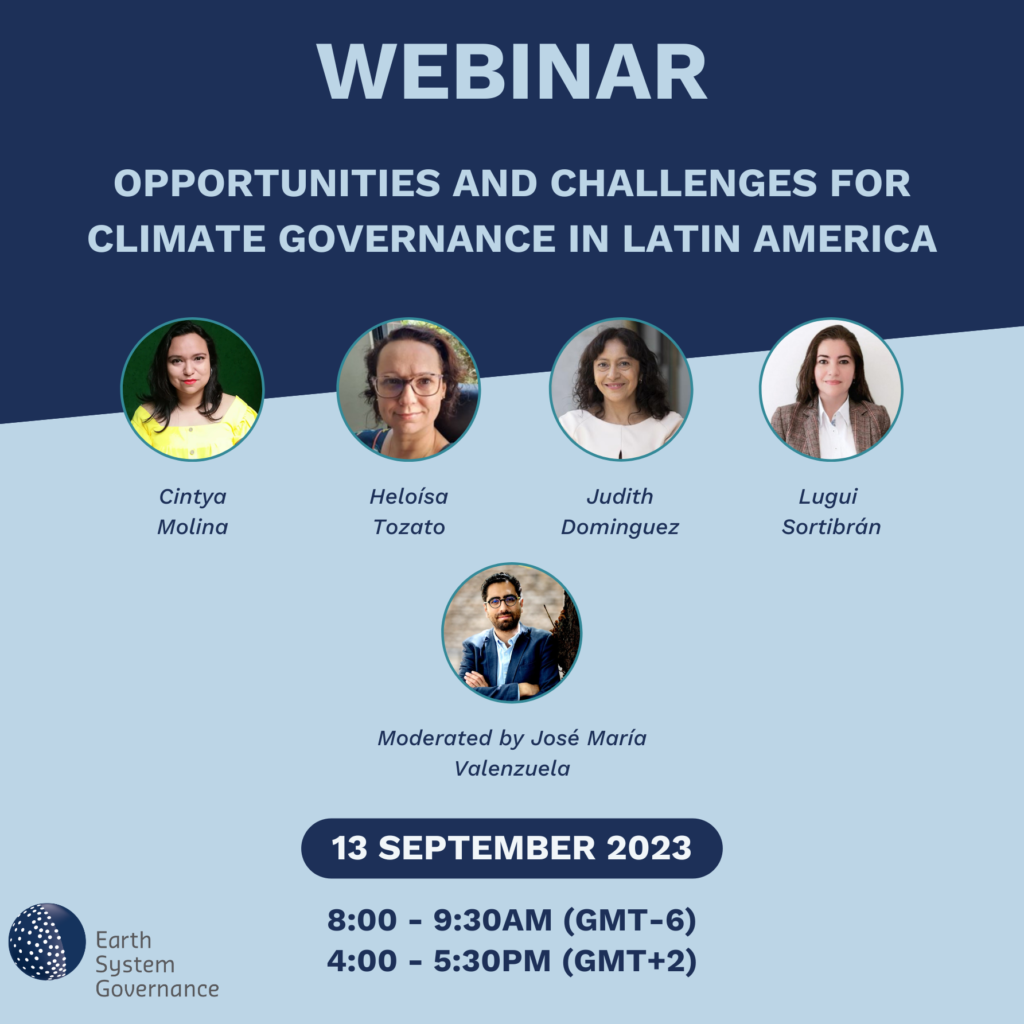On Tuesday, April 23rd, 2024, (8:00 to 9:30 Denver time, 10:00 to 11:30 Santiago time, 16:00 to 17:30 Amsterdam time, and 19:30 to 21:00 New Delhi time) a webinar on Exploring Planetary Justice: Views from Central America, Mexico and the Caribbean was held.
This webinar series is co-convened by Agni Kalfagianni, Stefan Pedersen, and Dimitris Stevis, and organized by the Planetary Justice Taskforce of the Earth System Governance Project and the Center for Environmental Justice at Colorado State University.
General Description
Intersecting social and environmental challenges are affecting and endangering the human and non-human realms on earth. This has intensified demands for justice, with some scholars proposing the concept of ‘planetary justice’. However, what exactly planetary justice means and whether this resonates with existing scholarship and practice of justice, especially in the ecosocial sense, is currently underexplored.
This joint initiative between the Earth System Governance project and the Center for Environmental Justice of Colorado State University aims at establishing an international network of researchers who are interested in exploring the place of planetary justice within their thinking and practice on ecosocial justice. For this reason we are conducting a series of webinars across different world regions under the title ‘Exploring Planetary Justice’. Participants are invited to address three main prompts drawing on their own research and experiences, which we will compare and synthesize at the end of the webinar series. Following a first webinar focusing on South America and a second webinar on views from Western Europe, in this third webinar we focus on Central America, Mexico and the Caribbean.
Prompts
- What do you see as the major theoretical and political tendencies within ecosocial justice in your region?
- What are the forces for or against ecosocial justice in your region, in addition to the global or planetary levels?
- Has the concept of Planetary Justice or something similar found its way into your region? How? What does Planetary Justice mean to you?
Ignacio Rubio Carriquiriborde is Professor at the Center for Sociological Studies of the School of Political and Social Sciences (UNAM). He studied sociology and obtained a PhD. in geography from King’s College London. His research has focused on the sociology of risk, disasters and socio-environmental conflicts, and my interests refer to sociological theory, space and materiality. He collaborates with the Environmental Justice network and with the Sociology of Risk thematic group of ISA and is also the academic director of the journal Acta Sociológica. Some of his publications are:
Riesgos ambientales e incertidumbres institucionales. Ensayos sobre desastres y política del riesgo. México: UNAM (2020); “Propiedad, infraestructura y conservación como mecanismos de exclusión en el proceso de desarrollo turístico en la costa de Oaxaca, México”, Revista de Ciências Sociais (UFC-Brasil), v. 51 n. 2 (2020), Ecologia Política: contribuições da América Latina (2020); “La sociología en el horizonte del Antropoceno” Acta Sociológica n. 78 (2019); Sociología del riesgo. Marcos y aplicaciones. Coordinador. México: UNAM. (2018); and “Tourism, Environmental Damage and Climate Policy at the Coast of Oaxaca, Mexico” en Silja Klepp y Libertad Chavez-Rodriguez (eds) Denaturalizing Climate Change: Perspectives for Critical Adaptation Research. Londres: Routledge (2018).
Gustavo Garcia is an engaged scholar, educator, and apprentice organizer from the islands of Puerto Rico. He has transdisciplinary social-environmental sciences training, combining political ecology, environmental policy and planning, and decolonial Latin American and Caribbean studies. His work centers on transformative eco-social initiatives and movements, bridging ideas of commons/commoning, autogestion, environmental/climate justice, and just transitions. He is currently FCT-CEECIND Assistant Researcher at the Center for Social Studies, University of Coimbra, where he co-coordinates the Ecology and Society Workshop (ECOSOC). Previously, he held the Prince Claus Chair in Development and Equity at the International Institute of Social Studies, The Hague (2019-2021, ext. 2022); and was Assistant Professor in the Graduate School of Planning at the University of Puerto Rico- Rio Piedras (2015-2019). He is co-founding member of Post-Extractive Futures (a self-organized collective from various collectives to foster thinking and action for post-extractive societies); the Climate Justice Network (integrating scholars and practitioners on research and education); and the Undisciplined Environments political ecology blog editorial collective. He lives uprooted from his lands but finding home and guiding stars in his daughter Maia. He is held in life by broad networks of care, of people, spirits, memories, and ecologies.
Celia Ruiz de Oña, a researcher at the Multidisciplinary Research Center for Chiapas and the South Border (CIMSUR) of the National Autonomous University of Mexico (UNAM), integrates Political Ecology with Border Studies to examine the emergence of socio-environmental conflicts in transborder zones due to conservation policies and the impacts of climate change adaptation policy.
Trained as an ecologist at the University of Edinburgh and as a journalist at the Basque Country University, she approaches environmental justice themes in campesino and indigenous coffee agroforestry systems and, more recently, with artisanal fishing communities on the Pacific coastlands of Chiapas and Costa Rica. Through the lens of Blue Justice, her work contributes to understanding new forms of coastal appropriation concealed behind conservation and sustainability narratives. She analyzes State resource access control policies, border dynamics, and the criminalization of fisheries and migrants to understand how such measures often culminate in dynamics of exclusion and dispossession, precipitating climate-induced migratory flows. Employing mixed methods, including qualitative analysis, ecological assessment, and audiovisual anthropology, she strives to amplify the voices of communities on the frontlines of socio-environmental conflict beyond academia. She is an active member of the ENJUST Network.
Sofia Avila is a Research Associate at the Institute of Social Research of the National Autonomous University of Mexico (IIS-UNAM). She holds a PhD and master’s degree in Environmental Sciences from the Autonomous University of Barcelona (ICTA-UAB), and a bachelor’s degree in International Relations from the National Autonomous University of Mexico (UNAM). Her work is rooted in political ecology, ecological economics, critical geography, and environmental justice studies, with a particular interest in social movements, energy, and climate change. Her ongoing project builds a Latin American perspective for Just Transition debates, situating labor and environmental movements as critical actors in building emancipatory socio-ecological projects. From 2015-2021, she was part of the Political Ecology Research Group and the collective Research and Degrowth, both at ICTA-UAB (Autonomous University of Barcelona). In 2019, she was a visiting PhD scholar at the Geography Department at Clark University. In 2021 she was a postdoctoral guest researcher within the “Energy Justice” project at the Pufendorf Institute of Advanced Studies (Lund University). In recent years, Sofia has been an invited lecturer in various postgraduate courses in Latin America, the United States and Europe. Her publications are available in Academia, Research Gate and Google Scholar.
Grettel Navas is a political ecologist working on toxic pollution, public policy and environmental justice. She is assistant professor at the Department of Political Studies at the School of government, University of Chile & Associate Lecturer of the interdisciplinary Master’s Degree in Planetary Health from the Universitat Oberta de Catalunya (UOC). Grettel completed her PhD at the Autonomous University of Barcelona being part of the ENVJustice project. She holds a Master Degree in Socio- Environmental Studies (FLACSO- Ecuador) and a Bachelor Degree in International Relations (National University of Costa Rica). She is an active member of the Latin American Political Ecology Group (CLACSO-Abya Yala) and part of the Direction and Coordination Group of the global Environmental Justice Atlas (EJAtlas) that documents environmental conflicts and resistance movements worldwide.








